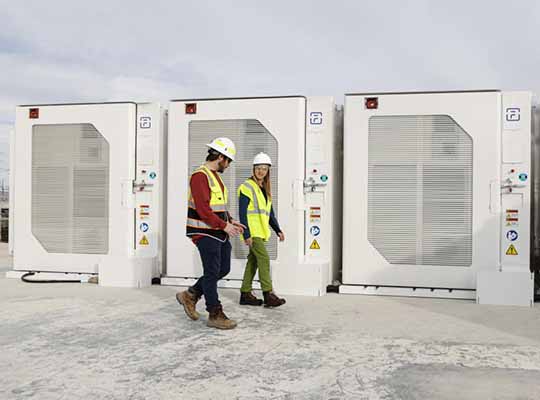ERLANGEN, Germany : Fluence Energy will supply a combined 11.7 MW/34 MWh battery-based energy storage system to Münch Energie, one of the largest decentralised energy suppliers and developers of photovoltaic power plants in Germany.
The project, scheduled for completion in April 2023, will co-locate Fluence’s Gridstack energy storage product with a 34 MW solar plant in in Merseburg, in eastern Germany. Once completed, the project will be directly connected to the electricity grid via a specially built transformer station, enabling Münch Energie to participate in the secondary reserve market (aFFR).
“Fluence and Münch Energie are committed to accelerating the energy transition, utilising smart energy storage to increase Germany’s share of renewables, reducing the country’s dependency on natural gas-based generation, and ensuring affordable electricity for German energy users,” commented Brian Perusse, VP sales and market development EMEA at Fluence.
“Renewable generation and battery-based energy storage are both critical in achieving Fluence’s mission to create a more sustainable future by transforming the way we power our world. We are proud to be working together with Münch Energie on the development of this project – the first one for Fluence to be deployed under the German Innovation Tender,” added Perusse.
In May this year, the project was awarded a contract in the Innovation Tender run by the German Federal Network Agency (Bundesnetzagentur). The tender is open to projects which combine solar generation and at least one other eligible technology per site that will share a grid connection point. The winning bidders are awarded the 20-year contracts with a fixed market premium price for the renewable energy they produce. By 2028, the market regulator plans to award contracts of up to 4 GWh to the developers of distributed energy storage systems under the Innovation Tenders.
“Münch Energie has decades of experience in developing solar plants with megawatt capacity measured in triple-digits. This, combined with our successful track record in constructing substations and grid connections, makes us perfectly positioned to partner with Fluence, a leading global technology company with a strong European footprint to deliver solar + storage projects in Germany,” commented Benjamin Voth, Project Manager.
“The German electricity grid is in full transformation, and it is now in our hands to position ourselves solidly for the requirements of tomorrow. To drive the further development of solar + storage projects in the country, Münch Energie and Fluence are planning more projects with triple-digit megawatt-hour capacity,” said Mario Münch, founder and CEO of Münch Energie.
In May, the European Commission published the REPowerEU Plan. The package of new policies is aimed at driving the construction of renewable generation projects. The European Commission proposed to increase the target for the energy generated from renewable sources to 45 per cent by 2030, up from 40 per cent previously planned and called for the installation of over 320 GW of solar photovoltaic generation by 2025, over twice today’s level, and approximately 600 GW by 2030.
“By combining intermittent solar generation with battery-based energy storage, the German electricity grid will be significantly more resilient. Fast-acting energy storage will be charged in the daytime during the periods of high generation and dispatched during the peak demand, usually in the evening. This way, we will not only contribute to increasing the share of renewable energy in the grid mix, but we will also supply the low-cost electricity at the times when the prices increase due to higher demand,” commented Benedikt Schwinger, project manager at Münch Energie.
For the accelerated deployment of renewable energy sources to be successful, Germany and the whole of Europe need rapid roll out of proven technologies which increase grid flexibility and enable safe and efficient integration of renewable generation into electricity systems, delivering security of supply, affordability, and sustainability. To this end, battery-based energy storage is a quickly deployed, cost-effective, and low-emission solution with the potential to become a backbone of modern, resilient, and decarbonised energy systems. It enhances network stability, eases congestion on transmission lines, and reduces renewable curtailment.











